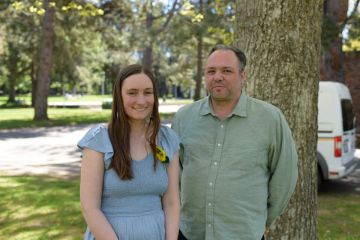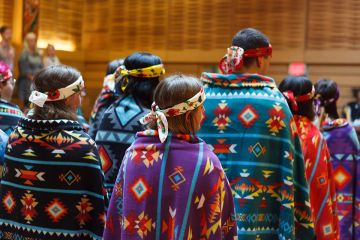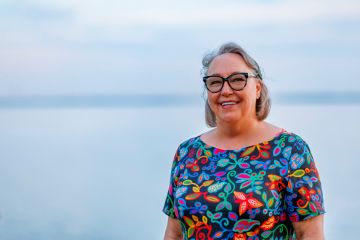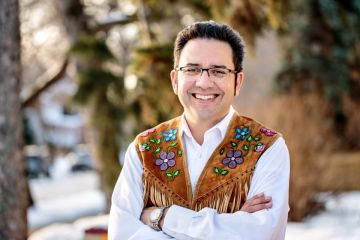The power of Indigenous podcasts
- Lisa Abram and Katy DeCoste
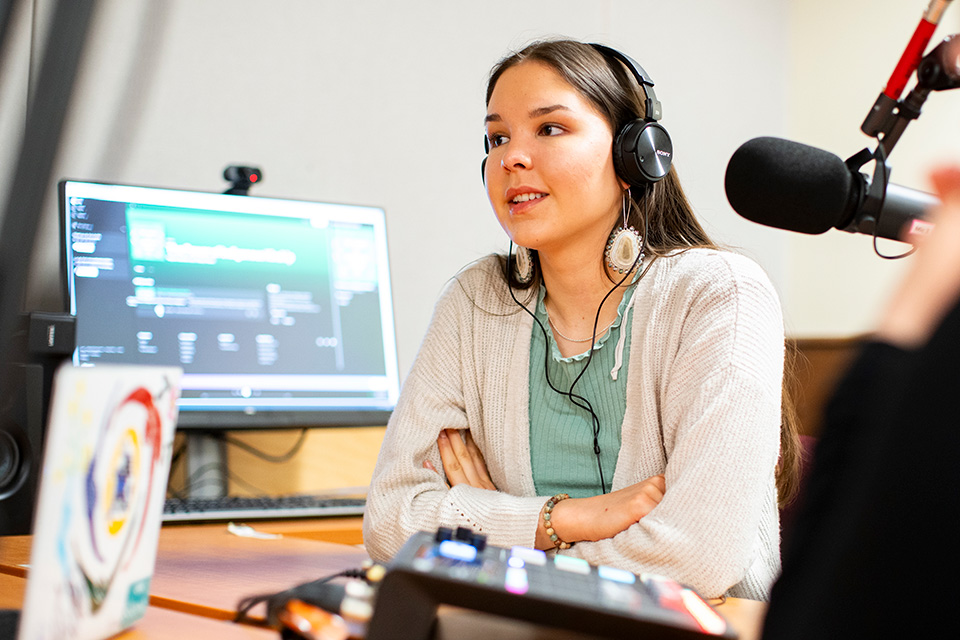
Technology supports Indigenous kinship
For millennia, humans have relied on storytellers to capture and share history amongst the masses. Those stories connect people—relayed events, culture, traditions, and information that nested into the collective consciousness. Storytelling collapses time so the tellers and listeners can join in on the happenings of their ancestors as well as generations to come.
Thanks to technology, entire generations are unearthing communities of like-minded people. Podcasting as a storytelling form has been around since the early 2000s, as MP3 audio file technology became more accessible via the ever-expanding internet. And as the technology has become more ubiquitous—enabling audiences to defy previous limitations like geography and time zones—oral storytelling is having a moment.
At the University of Victoria, people have latched onto the podcasting format for academic projects and pastimes. For several Indigenous students, faculty and staff, podcasting has emerged as something deeply personal—a vehicle through which their individual experiences can be shared to broader audiences.
Cultivating belonging
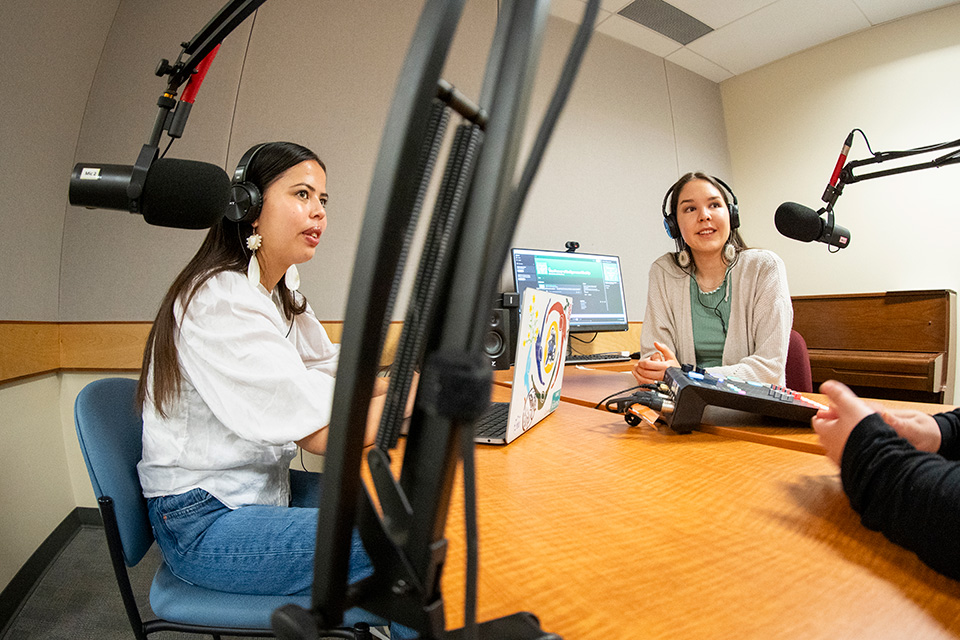
For first-year students and podcast co-hosts Haylee Gardiner and Tiffany Friesen, podcasting is an opportunity to cultivate Indigenous community on campus, share their experiences as first-year Indigenous students, and demonstrate their learning on their own terms.
Gardiner, a Dene Métis and English/French/German student, is pursuing a degree in biology with the hope of eventually attending medical school. Friesen, who is Nuxalk and Ojibwe/Cree, is studying psychology. The two met in an introductory writing course for Indigenous students held in the First Peoples House during their first semester at UVic. The course, offered by UVic’s Academic and Technical Writing Program and taught by Loren Gaudet, functioned almost like a homeroom for Friesen and Gardiner, and aimed to cultivate a sense of belonging at university as a learning outcome. Contemplating an optional extra assignment, the pair were inspired to share their experiences as part of a podcast named The Power of Indigenous Kinship.
“We wanted to create something that was going to be beneficial for other first-year Indigenous students coming into university,” Friesen shares.
They saw podcasting as a different way of learning and sharing knowledge.
We all come from different backgrounds. Having a space that opens up an opportunity for people to share is valuable.”
-Tiffany Friesen
Gardiner appreciates that podcasting in an academic setting allowed them to reflect themselves in their work. “The podcast showcases our learning on our own standards and our cultural practices of communication and oral storytelling,” she says. “Usually, we have the same type of conversations that we share in the podcast every day at the First Peoples House. Having it in this space was really special.”
One of their guests raised the same point during the podcast. Candice Cook, the LE,NOṈET First Year Coordinator, told their listeners that information and knowledge shared through spoken word resonates differently than in writing.
“My families have only been writing for maybe two generations. As Cree people, we’re more about oral storytelling. In our culture, words have so much importance. When opportunities like this came around, where I got to showcase my learning through a podcast or a video, I felt, ‘That’s where I shine!’” she tells Friesen and Gardiner, reflecting on her own experiences as an Indigenous student.
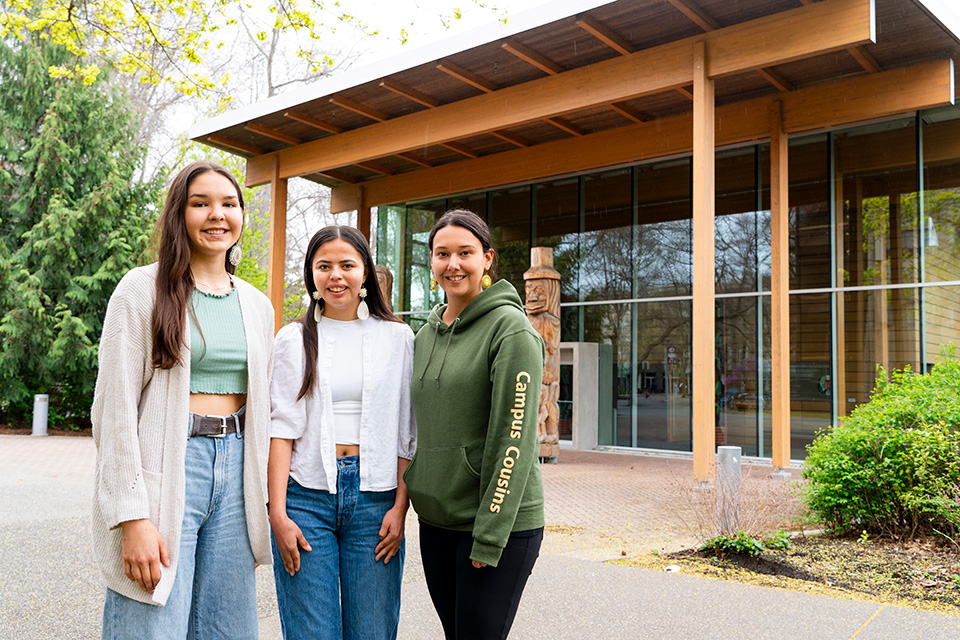
From left: Haylee Gardiner, Tiffany Friesen and Sydney Griffith have experienced first-hand the energy that podcasts produce amongst Indigenous People. Credit: UVic Photo Services
Sydney Griffith, a Campus Cousin and another guest on the podcast, agrees: “I think one of the main things that I’ve learned over my time at the First Peoples House is how important Indigenous ways of knowing and relations are. Talking [on the podcast] right now, we’re learning more than any paper. This is more important, because we’re sharing energy, we’re sharing space. Us gathering, us sharing stories, this is powerful in itself.”
In podcasting, Gardiner and Friesen hope to share different individual perspectives and stories, going beyond a single homogenized narrative to highlight and support Indigenous joy, success and excellence. Their work is already attracting attention: their conversational podcast won the Courageous Creativity and Audience Favourite awards at the 2024 Humanities Unessay Competition.
Podcasting and Indigenous family
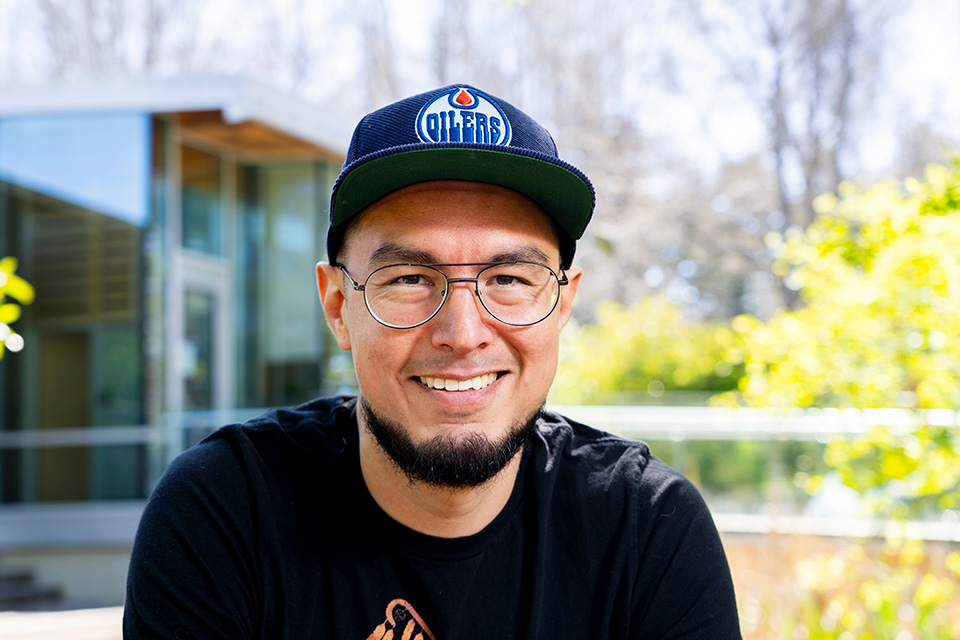
Elijah Buffalo views podcasting as a medium for learning and connection on a variety of topics. Credit: UVic Photo Services
For Elijah Buffalo, a UVic student from the Samson Cree Nation in Maskwacis, Alta., Treaty 6, he saw podcasting as a solitary, joyful pursuit that he could use as a resource for knowledge creation and sharing.
You know, the first episode that I recorded was with my late dad. It gave him an opportunity to tell his story. Not just to me, but to everybody. And he talked about the importance of sports as he was growing up in residential school. Whenever we'd go on a road trip my dad would always tell stories. And when I am on the road, and just hearing him talk or hearing anybody tell a story… I think that's a big part of why I got into podcasting.”
-Elijah Buffalo
He created a podcast series called Metawewin (meaning “to play” in Nehiyawewin) to incorporate Indigenous language into his work and studies. Metawewin takes a holistic approach, examining how sports and movement-based practices influence the ceremonies and relationships Indigenous communities have with the land, waters, and more-than-human relatives—important elements in Indigenous cultures. His episode called “Molecular Decolonization with Dr. Michael Yellowbird" won the UVic Libraries’ inaugural podcast contest.
“The podcast serves as a platform for discussions with diverse guests, including Indigenous athletes, Elders, academics, leaders, and allies,” says Buffalo. “Metawewin facilitates learning and connection with Indigenous individuals globally, focusing on topics like sports, medicine, and their roles in Indigenous resurgence and decolonization.”
In Cree culture, Wahkohtowin is a foundational value and system of law in governing kinship. Buffalo marvels at the influence of podcasting in communicating these values, and its role in preserving Indigenous knowledge. “It’s cool to hear that the other UVic students [Gardiner and Friesen] talk about kinship as the basis of their podcast,” says Buffalo.
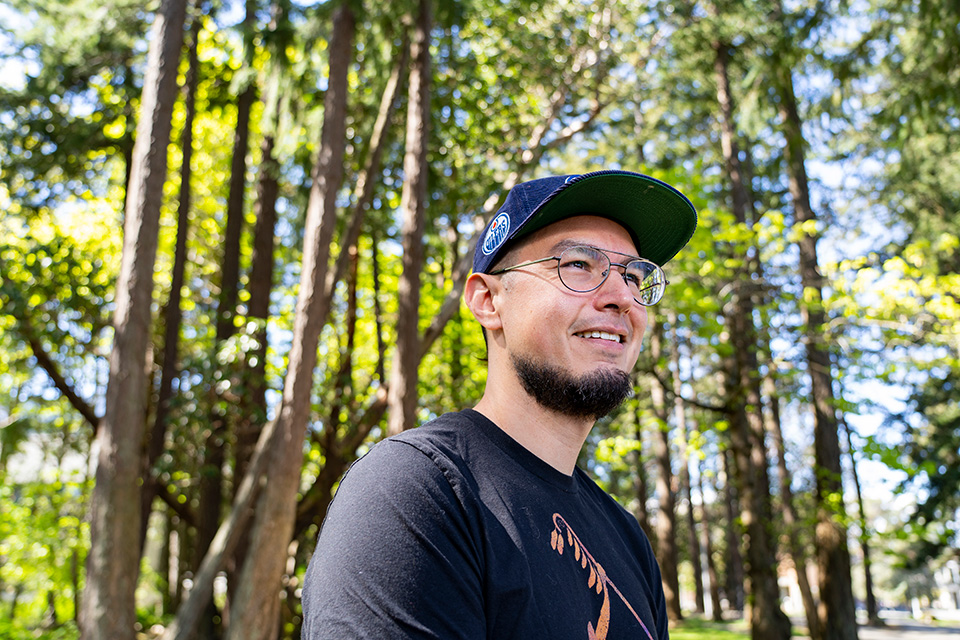
Since Buffalo began creating Metawewin, it has been a way for him to stay connected with his community while travelling, and a chance to get feedback on his Cree pronunciation. It also gave him a chance to share stories with his family from a distance when he travelled and lived in France for a while.
Recently, Buffalo’s full attention was on completing the 2023-24 UVic academic year, acknowledging that the path to getting to this point has not been a straight trajectory. But today, Buffalo is confident he is where he needs to be as he prepares for medical school in August at UBC’s Island Medical Program.
"I didn't listen to the first podcast episode for a year until the memorial feast for my dad on January 29. During that time we put all the photographs away, and then after that year, I listened to the podcast that we recorded. I wish that I had recorded more with him, but just to at least have that is really special.”
Library resources
Gardiner and Friesen recorded The Power of Indigenous Kinship in the Mearns - McPherson Library’s podcasting room, where equipment is freely available to students. For the pair, who had no prior podcasting experience, the library was an invaluable support in navigating the process of creating the show. And their podcast is not the only one to call the library their home base.
UVic Libraries Advanced Research Services Head Matt Huculak says the goal of the Digital Scholarship Commons has always been to help engage with scholarship in ways other than writing and to give students storytelling power with various modes of emerging technology.
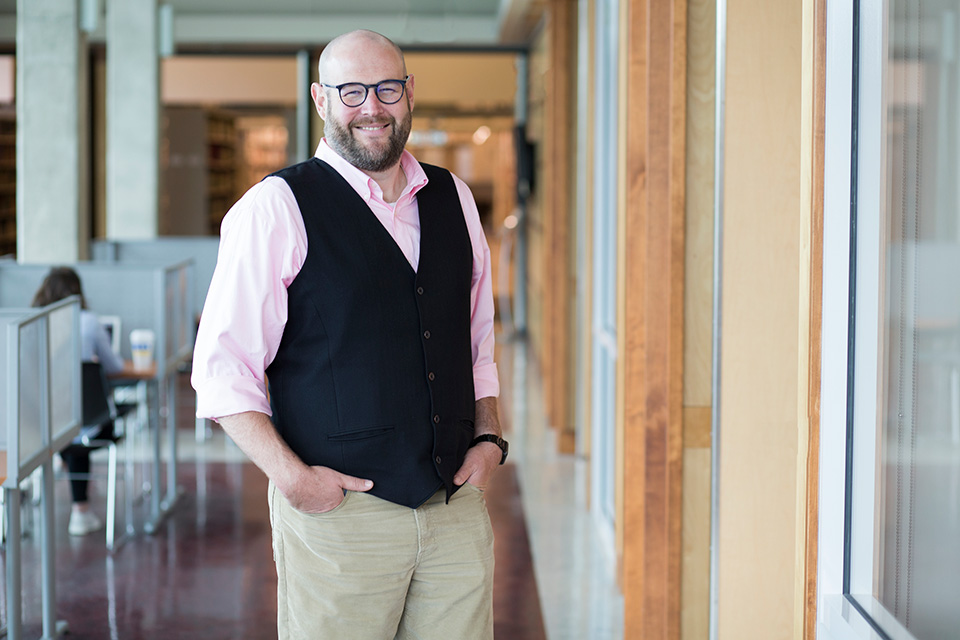
“Once we started doing podcasting, we realized that students were just using their computer microphones or iPhones, which was fine. That's a great way to start,” explains Huculak. “Then we decided to buy a couple of microphones and a sound mixer to have in the DSC in case folks wanted to be recording. And the more we engaged in this activity, the more we realized how much ambient sound matters, so we started looking around the library for space.”
Starting with “Podcast Curious,” a half-day event in 2019, Huculak invited SFU publishing professor and podcaster Hannah McGregor and campus colleagues to learn about podcasting resources and expertise, and to discuss how they could create a supportive community of UVic podcasters.
“I think that it's important to take the production side seriously. Now I have good equipment and software. But when I was first getting started with basic equipment, I still knew that the production side was important in making a good podcast,” explains Buffalo.
Today, the explosion in the popularity of podcasting as a medium for student’s academic output is evident: during the last academic year, the podcast room was booked 463 times and 182 students signed up for 11 podcasting workshops.
Building the library podcast room became a way to provide students with a resource. Much like we might provide students and faculty with an expensive book or a database, the podcasting room was a way to provide students with the best equipment that would provide them with a way of producing a professional level story, that they could share with whoever their community happened to be.”
-Matt Huculak
And it’s those communities that keep listeners coming back for more.
“I have my favorite podcasts that I go to every week,” says Huculak. “These people are like my friends and companions, because I listen to them while I do the dishes or when I'm working out in the garden. Their voices are with me. They are part of my home life. And that's the power of the podcast.”
Podcasting and documenting the truth
Ry Moran, associate university librarian – reconciliation, views the power of storytelling in the context of truth and reconciliation, and attributes the inspiration for creating UVic Libraries’ podcast, Taapwaywin, to three things: the important role that universities play in educating the public; the power of Indigenous stories; and the need to dive deeper into exploring complex questions.
With the surge in popularity in the field of podcasting, Moran, and Producer and Digital Production Coordinator, Reconciliation Karina Greenwood launched Taapwaywin in September 2022. “The first six episodes of Taapwaywin have covered a wide range of perspectives,” explains Moran. “Topics include truth telling; repatriation; laws and the burden placed on Indigenous Peoples to prove rights, names, place names, historical figures, and monuments; different ways of understanding the world we live in with regards to ecological realities; and how we can shape our understanding of the world to respectfully situate ourselves.”
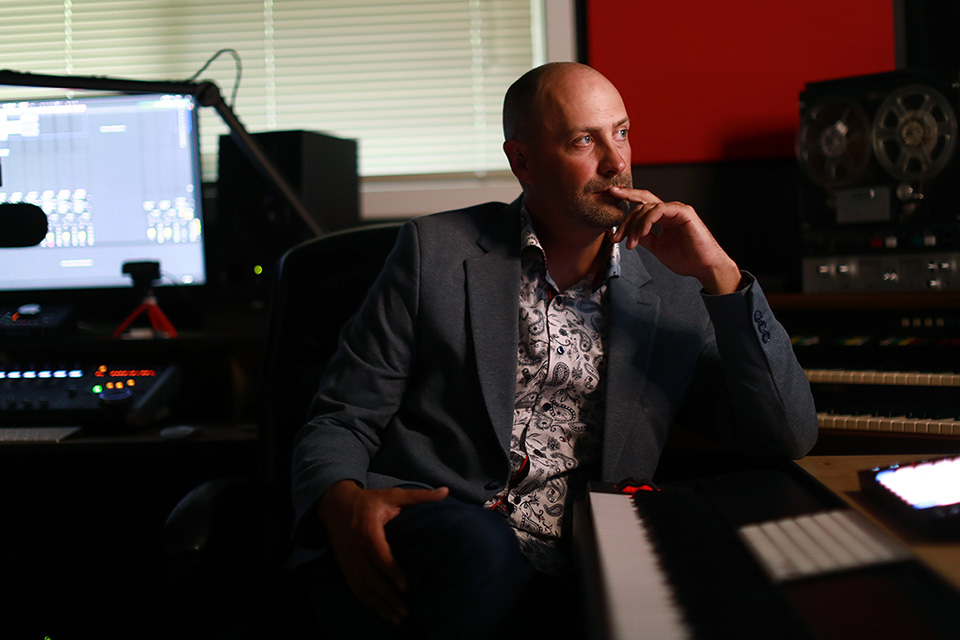
Ry Moran, UVic associate university librarian – reconciliation, launched the podcast Taapwaywin in 2022. Credit: Chad Hipolito
Coinciding with the podcast launch, UVic Libraries invited celebrated Pulitzer Prize and Peabody winning investigative Cree journalist and podcaster Connie Walker to host their annual University Librarian’s lecture. Walker, who has produced several provocative podcasts series (Missing & Murdered, Stolen), told a personal account of what happened to her father at the St. Michael’s Residential School in Duck Lake, Saskatchewan, and drew the listeners into Stolen: Surviving St. Michael’s with an intensity unmatched in other investigative mediums.
In 2023, Anishinaabe journalist Duncan McCue spoke to an audience about his award-winning podcast, Kuper Island, an investigative eight-part series that tells the story of unsolved deaths, abuse, and lies that continue to haunt the community and survivors. Moderated by Moran and sponsored by the UVic Lansdowne Lecture series, McCue’s thoughtful reflection on building respectful relationships with Indigenous communities reinforces the power of this medium in building community.
Since the launch of Taapwaywin, Moran plans to create additional episodes to open the minds and hearts of listeners who may not be familiar with the TRC’s calls to action, and to create a global community of truth-tellers who become informed and engaged. With its format, accessibility, and broad appeal to listeners––both novice and experienced–– podcasts support knowledge mobilization and continue to inspire a new generation of content creators.
“It's a medium that allows us to delve deeply into complex ideas, topics and subject matters. It also allows us to highlight some of the thinkers out there, including a number of our colleagues here on campus, working hard to make the world a more just, fair and equitable place,” adds Moran.
Photos
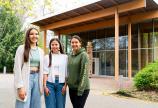
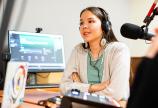
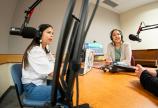
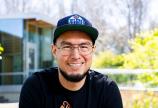
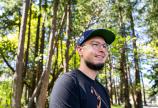
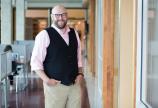
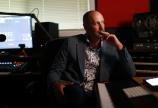
In this story
Keywords: Indigenous, community, student life, student
People: Haylee Gardiner, Tiffany Friesen, Candice Cook, Sydney Griffith, Elijah Buffalo, Matt Huculak, Ry Moran

